#Civil War (1861-1865)
Text
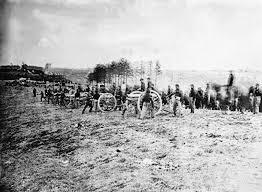



More soldiers died in the Civil War than in all other US wars combined
#US Civil War#American history#archival photos#casualties#US history#North vs South#Confederate army#1861-1865
21 notes
·
View notes
Note
I saw a post about racist Jasper stans bitching bc they’re not able to enjoy shitty J*sper content bc of tags or whatever lol and someone said: “What is there even to enjoy?”. I had to laugh and I thought if you bc it’s so true. Most Jasper content isn’t even that enjoyable. It’s mostly the same boring white-supremacist garbage that I’ve seen before; even the jalice stuff is played out.
The only J*sper content I enjoy is content where he is worshipping Maria, thinking about Maria, talking about Maria, loving Maria, doing anything for Maria tbh. Is that bad? XD I owe it to you and your writing! idk something about a 19/20 year old dumbass confederate falling madly in love with a native brown woman and literally seeing her as a god-like figure as she’s basically handing him his karma for his racist crimes sends me. Ppl act like he was this awesome person before Maria and that it’s her fault he’s gutter trash now with the C*llens but he was gutter trash BEFORE he met Maria. She honestly made him so much better, stronger and MUCH more interesting. She literally created the man these stans thirst over so much. She is the blueprint.
the thing anti-María Jalice stans don't get is, without María, you do not have Jasper. for everything Jasper is, María is the catalyst ❤️
canonically, all we know about Jasper Hale pre-change is 1) he was born in Texas, 2) faked his age to join the Confederate Army* where he became the youngest major in Texas, & 3) was persuasive
beyond that, María made Jasper into the man the fandom adores. you like that he's an empath? guess whose venom made him one. you like that he's a warmonger? guess whose war he fought for. you like that he has a troubled past? guess who put the trouble in it. you like that he's "soft" "empath" "baby" (tbh i don't see it but ok)? guess who made him want to be that way. you like that he's submissive to Alice? guess who broke him in first.
you want Jasper with Alice but wish the María era didn't exist? lol just say you want the hot faceless Confederate to get with the psychic Mississippian & go
as for me, MARÍA ALL DAY BAYBEEEEE
here we have a woman who has suffered all her life at the hands of colonizers. born "1800s or earlier," we can suppose she has firsthand experience with colonization (at least Napoleon's invasion) & lived through Mexico's War of Independence. i.e., she has a deep familiarity with what it means to have your way of life ripped from you by invaders. PLUS she was a victim of Benito's army in the Southern Vampire Wars; her entire coven including her mate was killed.
& despite her losses, she rallied to take back her land & drive out her oppressors. baseline, she is a strong, cunning, powerful indigenous woman with a deep love for her community and her people. HOT
now let's look at Jasper, a bright leader in the Civil War who suffered defeat at the hands of the Union army. yes, María changed him. but did she force him to stay? to go to war? the newborn vamp with the strength & speed to overcome a "grown" vamp chose not to do so. the empath with the power to make anyone disregard him chose not to use it. some say María was "abusive" & "manipulative," but few acknowledge that Jasper had a choice.
why didn't Jasper leave? because he's submissive to anyone more powerful than him. because he was a loser. because the Southern Vampire Wars gave him a second chance at victory. because "empath" or no, he wanted to play war & win.
that's what's compelling about Jasper/María. as wrong as Jasper was for fighting for the Confederacy, he believed he was fighting for the same thing as she. he saw his way of life destroyed by "invaders" & fought back. it's a sick & twisted parallel between oppressor & oppressed that becomes subverted as their relationship goes on... & one that can heal them both.
María's experience with colonizers gives her a visceral picture of what it means to be oppressed... but her relationship with Jasper gives her the victory & emotional reflection she needs to move on. Jasper's military training gives him the hunger & knowledge for war... but his "curse" of empathy provides him with the tools he needs to recognize & address the horrors of his problematic past & move on.
tbh, i find Jasper & María are perfectly suited for a delicious character-driven narrative. Maria's story is that of a traumatized indigenous woman on a path from colonization to decolonization, & the sacrifices & destruction she endures realize that vision. Jasper's story is that of a troubled man on the path from self-hate to self-love, & what it means to undo the societal teachings/traumas & forge a life of empathy & forgiveness.
& that is something Alice alone can never give Jasper.
tl;dr all hail Queen María
#*non-americans: the Civil War (1861-1865) was a battle between Northern (Union) & Southern (Confederate) states...#...over whether to permit slavery in new U.S. territories.#maría my beloved#anon i'm glad you like my María writings (when i used to post them)!#anon thank you so much for giving me this ask and allowing me to just rave about María you are so wonderful <3333 thank you come again#twilight#twilight renaissance#the twilight saga#jasper hale#jasria#jasría#asks#(disclaimer: i don't hate jasper. i do not think of him. no hate to jalice stans either. lichrally i do not care. i simply love maría)#god i love her so much#most underrated character of the whole saga tbh#honestly if i didn't have this rewrite going on i would DEFINITELY LOVE to take a crack at writing The Jasría Story#i just see this gorgeous gothic horrific bloody strangely uplifting & bittersweet vampire novel#it's got death and sex and horror and blood and everything Twilight should've been but Worse (and Better)#ok fuck it fuck it FUCK IT I'M DOING IT. I'M OPENING A DOC. I'M TAKING NOTES. I'VE GOT TO WRITE THIS. SHE DESERVES IT#the-most-pathetic-edge wya bestie#let's change the renaissance. For Her#su-angelvicioso#i hope you see this & i hope you're doing well & if i write this series it's for you & i will get this story to you somehow
32 notes
·
View notes
Text
Medical Care During the American Civil War

One of the most important areas of study re: the 47th Pennsylvania Volunteer Infantry is the medical treatment that 47th Pennsylvanians received while in service to the nation. A significant percentage of the men who served with this regiment were wounded in battle, injured in some other way while on the job, or were sickened by a wide range of illnesses. Be sure to check out the Medical section of the 47th Pennsylvania project's website.
Image: “The Civil War Surgeon at Work in the Field, Winslow Homer,” 12 July 1862 (National Library of Medicine, public domain).
#american civil war#civil war medicine#american history#america#civil war#ap us history#1861#union army#us history#us army#infantry#winslow homer#1863#1864#1865#1860s art#digital humanities#digital archives
5 notes
·
View notes
Text
Divorce, disease, alcoholism, servants, abuse, and gun violence: From Hazel to Josephine
Philabert Packard, my ancestor, briefly mentioned in the probate records after her husband’s death in 1839, with yellow underlining as my emphasis, via New Hampshire, U.S., Wills and Probate Records, 1643-1982 for Henry Thayer, Cheshire, Estate Files, T196-T248, 1837-1847, Probate Estate Files, 1769-1885; Author: New Hampshire. Probate Court (Cheshire County); Probate Place: Cheshire, New…

View On WordPress
#Albany NY#alcoholism#cemeteries#census enumerators#Civil War (1861-1865)#Cora Estelle Packard#Cora Hodgemann#cruelty#death#desertion#divorce#Eaton WS#Greenville MI#gun violence#guns#Hamlin MI#Hannah C. Paddock#Jackson MI#Josephine Jane Packard#laundress#Manitowoc MI#Marietta OH#marriage#murder#Northumberland#prisons#Schleswig WS#second cousins#servants#shootings
0 notes
Text
Field Artillery Carriages
Artillery played a significant role during the Civil War, with innovations in rifling and ammunition making cannons more accurate and deadly. While often overlooked, the carriage was a vital component in the effective deployment and use of these powerful weapons. Despite their heavy appearance, the design of the Civil War-era field artillery carriage provided excellent maneuverability. A trained…

View On WordPress
0 notes
Text
Vagabond
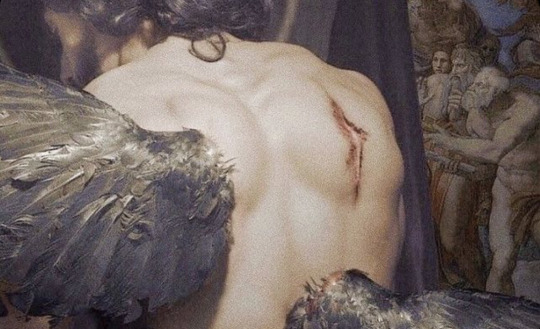
Vagabond — wandering from place to place without any settled home
Poly Lost Boys x GN Reader
Synopsis: Forgiveness is a fickle thing. When four souls find each other, the world finds its equilibrium once more; until the absence of another tips the scale forever. What happens when a familiar face shows itself back at the boardwalk after twenty years of absence?
Warnings: slight angst, lots of historical information in the beginning
Word Count: 3k
By issuing the Declaration of Independence, adopted by the Continental Congress on July 4th, 1776, the 13 American colonies severed their political connections to Great Britain.
You had been ten during the conflicts between America and Great Britain, young and impressionable. Your family came with Puritans, who set sail to America back in 1630. Unlike the Pilgrims, who had left ten years earlier, the Puritans did not break with the Church of England but sought to reform it. All that happened before you were born; your ancestors had settled down and spread their roots into American soil.
You recalled little of the American Revolution; after all, you were very young back then, but you remember December 15th, 1791, vividly. Your mother couldn't stop crying that day, and your father had pulled out the oldest whiskey they had that day. America was finally severed from the tyrannical rule of George III.
You came to understand the significance of those dates more as you aged, growing into a strong individual as you helped your family on their farm. You never intended to marry; it wasn't something you had ever desired or looked forward to. The same year you had gotten married was the day you lost your immortality; both events are related but not necessarily connected. You were introduced to the vampiric community in New Orleans, a city that used the day to sleep off the mistakes you made throughout the rambunctious night.
You had lived through the formation of the Constitution of the United States of America in 1787 when the founding fathers sought to implement more structure into the now independent country.
The infamous whiskey rebellion. American drunks apparently were not too keen about Alexander Hamilton implementing a liquor tax to try and raise money for the national debt; asserting the federal government's power back in 1794.
Only nine years later, the Louisiana Purchase happened in 1803. The small land purchase for only $27 million created room for the states of Louisiana, Missouri, Arkansas, Iowa, North Dakota, South Dakota, Nebraska, and Oklahoma, along with most of Kansas, Colorado, Wyoming, Montana, and Minnesota.
Throughout the 1810s and 1830s, you had moved on from New Orleans and left for New York, seeking human connections and reconnecting with the younger generations. During that time, the Battle of New Orleans in 1815 and the Monroe Doctrine in 1823 seemed to fly past you.
Then, signed on February 2nd, 1848, the Treaty of Guadalupe Hidalgo finally brought closure to the Mexican-American war. At this time, you were no stranger to political conflicts anymore, and the stench of blood and sweat staining battlefields was, unfortunately, no stranger.
Life moved on regardless, no matter the horrid realities life provided. For a short while, life had finally come to a stand-still, guns tucked away as the world in America resumed its development. Until April 12th, 1861, Confederate troops fired on Fort Sumter in South Carolina's Charleston Harbor at 4:30 A.M., A day that changed America forever, the beginning of the American Civil War.
The Emancipation Proclamation, The First Conscription Act, The Battle of Chancellorsville, The Vicksburg Campaign, The Gettysburg Campaign, The Battle of Chickamauga, The Battle of Chattanooga, The Siege of Knoxville. The list continued, and the coppery smell of wasted humanity tainted the air, the wind carrying the cries of victims throughout the nation.
The war ended in the Spring of 1865. Robert E. Lee surrendered the last major Confederate army to Ulysses S. Grant at Appomattox Courthouse on April 9th, 1865.
The number of soldiers who died throughout those four years eventually got estimated to be around 620,000.
Only 47 years later, on July 28th, 1914, the Austrian Archduke Franz Ferdinand was assassinated, beginning the cruel trench warfare of World War I. In early April 1917, America aided the effort to join a war to end all wars. You had entered the war effort, like everyone capable at the time; from soldiers to nurses, everyone gave aid.
On November 11th, 1918, the war ended. Although the Allies won, you found no reason to celebrate. Not when mothers sold their homes since there wasn't a reason to have a multiple-bedroom house anymore, when graveyards overflowed with the dead, when people mourned their losses, when mothers' only answer to their missing sons was a notice declaring their child missing in action.
The stock market crashed in 1929, kicking off the Great Depression that would last for more than a decade.
On September 1st, 1939, Germany invaded Poland. Kicking off World War II and beginning one of the most brutal warfare's, Blitzkrieg. On May 8th, 1945, Germany surrendered. After the atomic bomb was dropped on Hiroshima and Nagasaki, Japan surrendered on September 2nd, 1945, and the Second World War came to an end.
The war ended, and the surviving soldiers returned with missing limbs and broken spirits. You were a firm believer that humans were not meant to witness so much death; it tainted them; it dulled them. Although you were a vampire, a creature supposedly made for horror, you could not forget what you had witnessed in only the span of 21 years.
You were 201 years old now, relatively young in the grand scheme of time, but you had lived through a few of the greatest horrors the world had ever seen.
189 years of traversing the lands, you watched grow in a desperate search to find one of your own. Since you were turned and left New Orleans, you had not met a single vampire. You watched with sorrowful wisdom in your eyes as the world passed through you, virginity in people's expressions you wish you had. A gaze untainted by warfare, civil unrest, and brutality.
Although you have met the occasional human to brighten your own world, it did not cure you. Your search was desolate—fruitless.
Your feet had carried you to Santa Carla, the year now being 1963, and just as the five stages of grief had settled on acceptance. You bumped into a group of four rambunctious bikers that would change your life forever. That had been the first time you had met, and you had continued to live together, going on to live through the Civil Rights movement and grieving the assassination of Martin Luther King, Jr.
But on August 12th, 1967, you left Santa Carla. Your absence is only justified by a delicately written letter standing in your place. You had grown to love the boys, but you had lived differently compared to them.
Marko and Paul were younger vampires than you, having been turned while The Great Depression was bulldozing America. Dwanye had been older, abandoning his immortality in the 18th century along with David. All of them possessed the innate ability to move on from the past, a talent you, unfortunately, did not possess.
No matter how hard you tried, you could not find peace or excitement in the future. The uncertainty corrupted you, tormented you and your experiences, so you left. Not with the intent to abandon but to sort out whatever you had to sort out. Away from the prying eyes of those you loved, those who you did not want—couldn't disappoint.
Santa Carla, the town you had never been able to forget. It was 1987 now; twenty years had passed since you had seen the four vampires. You had missed them—a melancholic weight having nestled its way into your heart ever since you left. You regretted the way you had left through a simple letter. A cowardly move; you were wise enough to understand that. But at the time, you couldn't bring yourself to say it to them. How could you? Look someone in the eyes, someone like you—your own pack that never did anything but love you—and tell them you were leaving?
You didn't have the heart, and if you were a little more honest, you didn't have it now, either. But you missed them more than your hurt pride by walking what felt like a walk of shame as you wandered around the busy boardwalk. One thing you never could get used to was the constant shift in fashion, it felt like the ins became the outs overnight, and you never were able to keep up with it.
Bright colors were the most fashionable now, with teased hair and loud makeup. You enjoyed it, your knowing eyes watching over the crowd. The smell of hairspray permeated the air, wafting towards you as you passed people. Bulky and oversized clothes were spotted throughout the crowds, some men and women wearing specific member-only jackets. Ah, it seems the surfer nazis still haven't given up on Santa Carla yet.
The amusement park was new; back in 1867, the boardwalk had small shops littered around—like a market. Originally it mostly sold food and groceries, fish caught fresh from the sea, and farmers selling their produce.
How has the pier changed so significantly? If it wasn't for the bold, attention-seeking sign that said Santa Carla Boardwalk; you would've thought you were at the wrong address. But stepping on those old wooden floorboards of the pier that occasionally creaked or sunk under your feet was an all too familiar feeling. The smell of salt, rotting seaweed that had washed onto the shore, and the fresh street food made you feel all too at home.
It felt like you had never really left.
Your appearance had changed quite a bit since you left Santa Carla, so you didn't expect either the boys or Max to really recognize you. But although you were willing to stay under the radar for the boys, Max was another story. He was a head vampire, a coven leader, and therefore needed to be notified of your presence.
Entering Max's video store made you feel nostalgic, the same old grimy bell still hanging atop the doorframe signaling your arrival; you had been the one to put that there to originally annoy Max. You were surprised he kept it. The wooden floorboards and furniture gave off a distinct, homey smell. You had been there when the store was built, and the shiny coating across the floors now had grown mat, occasional wood panels brighter in color than before.
"I never thought I'd meet the day I saw you walk through those doors again."
Turning around, you met the stern gaze of Max. His outfit made you smile, a desperate attempt at blending in with the crowd. Max was always a stickler for blending in; if he had no intention of turning you; you had no business knowing who; or rather what, he was.
"It's good to see you."
"I'm flattered, but I doubt that I am the sole reason you returned." Max always carried that knowing tone, as if he's watched out every move you'd make before you made them. It reminded you that Max had a coven before the boys and you, one he rarely conversed about. Perhaps Max really had seen this turn out before, but analyzing that surprised expression, you could only assume who had left never did come back.
"How right you are," You sighed, shoulders dropping as you hopped onto the cashier counter. It was before opening, meaning you and Max had some time to chat privately.
"Twenty years is a long time," Max hummed, a low and almost chiding tone. "What made you come back?"
"To us, it isn't," You weakly argued back. The cumbersome feeling, or rather an awareness that you were in the wrong, was nearly unbearable. You were smart enough to understand that denial was a fruitless endeavor, and yet you couldn't help but let those desperate attempts escape you.
"For people waiting for you, it's an eternity." Max sighed in a calm but chiding tone. Although Max never did have to scold you the way he did with the boys, from not committing arson to preventing fights. Max instead focused his guidance towards you on a more emotional level, the morality; a bit ironic being taught by a vampire—but he did his best.
You glanced outside, through the glass walls of Max's shop, watching the bustling crowd pass you. Twenty years to a vampire was nothing, but somehow the short span of time felt arduous. Why did you come back?
"I never intended on staying away forever. I knew that when the time was right, I'd return." You explained, stealing a quick glance at Max. The older man had a frown etched onto his face, eyebrows furrowed as his own gaze lingered on the rambunctious humans outside. So unaware of the constant and unrelenting passage of time. It was cruel to be immortal; the passage of time no longer hindered you. But emotions are bendable and are the only aspect of ourselves that remains from who we were. Emotions were mortal.
"Santa Carla has changed, Y/N. It is not what you left behind; they are not the same as they were alongside you." Max recalled, his voice disapproving.
You knew Max was correct; you knew deep in your wrenching and twisting gut. You jumped off the counter, your feet hitting the floor like gravity had shifted around you, sinking your body into the floor. "I know," you knew; perhaps the boys didn't even want to see you; they could curse you out and send your name to hell for all eternity. They deserved to do it too.
But they loved you once, and perhaps you can't help shake the feeling that they might love you again this time too.
Max sighed, walking over to his front door and twisting the closed sign around, and pronouncing the store now open. Each tap of his foot, synced with his steps, was like a thundering echo inside you. It prompted you to get up and to provide closure for the others. You reach the door, opening midway before Max leaves you with some parting advice.
"I hope you find what you came here for, Y/N. But the time might be right for you now, but it might not be for them."
You nodded, not looking back as you walked out of the store. The air was warmer, humid from the ocean breeze mixing into the air, the notorious assassin for any styled and teased hair due.
Laughter was one of your favorite sounds. As cliche as that might sound, it felt rejuvenating to hear. Whether it was a loud cackle mimicking the call of a hyena or a high-pitched wheeze or whistle. There was a beauty in people's expressions, how their noses tended to scrunch up, or how others held their stomachs and nearly doubled over. Laughter was infectious, and you loved observing the dopamine spread to others. Strangers connecting over a similar sense of joy; there was a beauty in it.
The boardwalk was filled with it, people brushing shoulders against shoulders as they walked. Groups cackling and shoving each other as they enjoyed the youngness of the evening. Music booming from different directions, punks blasting the newest rap or metal music, hippies tuning out to a gentle jam, but the loudest seemed to be a distant concert down the boardwalk and closer to the pier. Like a bee sensing some honey, you followed. Dodging the occasional passerby, ducking out of the way from shop owners lugging their merchandise around.
The music got louder, and a small thread of excitement seemed to push you further, faster. Your small stroll transformed into a quickened step, your ears guiding you and your eyes following the crowd. The music was loud; a tight smosh-like pit had formed before the stage where people grind and brushed against each other to the beat of the music.
Looking around, you scanned the faces of teenagers and young adults. There was an eager but dreaded nervousness to your gaze at the thought of seeing a face that looked familiar. But it wasn't your eyes that caught their presence, but rather your sense of smell.
Copper.
Although it was harder to pick up when the wind stills its prancing, the occasional breeze led you further towards the pier. Away from the smosh pit, and where people stood to enjoy the music but not risk getting mulled over by a hormonal teenager.
There they stood, strikingly familiar. Although some of the fashion had changed, most of their originality stayed intact. That tiny red flag tied around Dwayne's waist was something the two of you had stolen from a stingy bar owner back in 1964; Markos jacket still had all too familiar patches sewn into its denim fabric; Paul still wore those bracelets you gave him, and David wore the most prominent reminder of you, his oversized coat.
The wind picked up around you, a cold and mocking breeze flowing through your hair and betraying your presence to the four men you had left behind all those years ago. One by one, heads lifted, smiling ceased, and laughter died. Although you had spent years preparing yourself for this moment, nothing felt so gut-wrenchingly real than standing before them.
How do you look someone in the eyes after you've abandoned them?
How do you move past that moment when the world around you stills and halts. When you lose yourself in the blear of the world when mortality reaches its hand around your heart and squeezes. A vice-like grip, a feeling blooming within your chest so heavy–so unspeakable. When you see those eyes, recognize the sorrow behind them and realize you were the perpetrator. You were the one who put that agony, that sadness there.
The burden of your actions ties itself around your throat like a noose, tight and unyielding, as you realize the cruelty was done by none other than yourself. And there is no way, in any shape or form, you could reverse the damage you've done. Pain is immortal, it might yield to its throbbing, but it never forgets.
A world with your boys back in 1967 exists now only in your memory. The four men, cold as the autumn waters, were your reality now.
"Hello, boys."
#the lost boys 1987#poly lost boys x reader#tlb#the lost boys marko#the lost boys david#the lost boys dwayne#tlb x reader#tlb paul#tlb david#tlb marko#tlb dwayne#dwayne tlb#paul tlb#marko tlb#david tlb#laddie tlb#star tlb#the lost boys star#the lost boys x reader#the lost boys#tlb fanfic#tlb x you#tlb headcanons#tlb imagine#the lost boys paul#the lost boys michael#tlb michael#michael x reader
483 notes
·
View notes
Text

Today In History
John Mercer Langston was born on this date December 14, 1829. In Louisa, Virginia.
Langston was elected Clerk of Brownhelm Township, OH, in 1855. This election is believed to be the first in which a Black person was elected to public office.
He helped recruit African American troops during the American Civil War (1861–1865). After the war, his involvement with the Freedmen’s Bureau as inspector of schools brought him back to Virginia.
Langston later became Virginia’s first Black Congressman.
In 1870 Langston became dean of Howard University’s law school and served as acting president of the university from 1873 until 1875. In 1885, the Virginia State Board of Education named Langston president of the new Virginia Normal and Collegiate Institute.
CARTER™️ Magazine
#carter magazine#historyandhiphop365#wherehistoryandhiphopmeet#history#cartermagazine#carter#today in history#staywoke#blackhistory#blackhistorymonth#John Mercer langston
136 notes
·
View notes
Photo
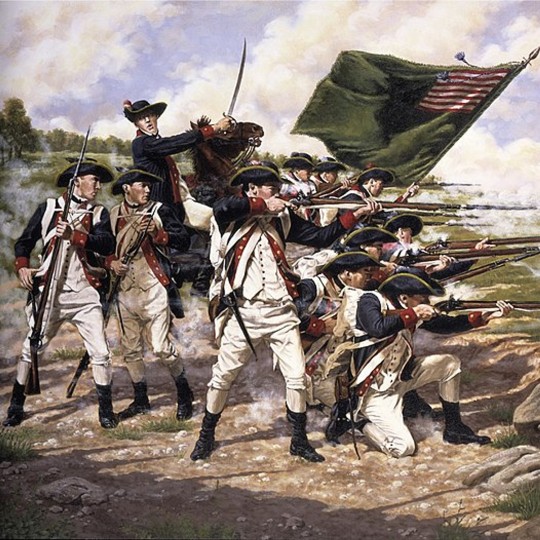
Weapons in the American Revolution
The American Revolutionary War (1775-1783) was a long and bitter conflict fought between Great Britain and its thirteen North American colonies over the Americans' liberties and, eventually, for the independence of the United States. The war, which was fought with both conventional linear tactics and guerilla-style warfare, utilized several different kinds of weapons for multiple styles of combat.
Some of the weapons used in the Revolutionary War had long been staples of European-style warfare. Variations of the flintlock musket, for instance, had been used in battle since the early 1600s and would continue to be used on Western battlefields for decades after the American Revolution had ended. Other weapons, like the groove-barreled Long Rifle, were relatively new additions to warfare; the rifle, used in a limited capacity during the Revolution, would see greater use on the later battlefields of the Napoleonic Wars (1803-1815) and American Civil War (1861-1865). Some weapons were useful in close-quarter combat such as the bayonet, tomahawk, and saber, while artillery guns were devastating at both long and short distances. None of the weapons discussed in this article were unique to the American Revolution. However, a quick description of the types of weapons used in that conflict could help give the reader a better understanding of what it may have been like to be on a battlefield during the US War of Independence.
Flintlock Muskets
The flintlock musket was the primary weapon of 18th-century European armies and was therefore used by both sides during the American Revolution. A musket was a muzzle-loading, smoothbore weapon that fired a large lead ball with reasonably decent accuracy. By the 1770s, a typical musket weighed about 10 lbs (4.5 kg), was about 5 ft (152 cm) in length, and had a caliber of about .75 (1.9 cm). A typical lead ball weighed about an ounce (28 g). As the name 'flintlock musket' suggests, such weapons relied on a flintlock mechanism to fire. This involved a piece of flint contained within the musket's cock, or hammer. When the trigger was pulled, the hammer would swing forward, causing the flint to strike a piece of steel called the 'frizzen'. This action created a spark that would fall into a flash pan below, wherein a small charge of black powder was contained. The spark would ignite the powder, which would, in turn, discharge the bullet from the gun barrel. By the time of the revolution, flintlocks had long been the most common kind of firearm; the flintlock had been developed in France in the early 1600s to replace the earlier matchlock and wheellock mechanisms and would remain in use until the mid-19th century.
Although the process of firing a flintlock musket sounds complicated on paper, a well-trained 18th-century soldier could typically fire three or four shots per minute. This is quite impressive, especially after considering what the loading process entails. A soldier would first take a pre-rolled musket cartridge – a paper tube containing gunpowder and a lead musket ball – and tear it open with his teeth. He would then pour a small amount of the powder into the flash pan and pour the rest down the muzzle. Next, the soldier would use a ramrod to pack the musket ball, powder, and paper of the cartridge down into the breech. Only after returning the ramrod to its place and fully cocking back the hammer was the soldier finally ready to take aim and fire.
The musket could be effectively fired from a range of about 80 yards (73 m); while it could sometimes be effective at a slightly greater range, musket balls rarely traveled more than 150 yards (137 m). The musket's accuracy largely depended, of course, on the man who wielded it. To increase the effectiveness of the weapon, 18th-century armies adopted the style of linear warfare; an individual musketeer was less likely to inflict damage than a line of soldiers firing coordinated, concentrated volleys. A typical battle line consisted of two or three ranks of soldiers standing shoulder to shoulder, with each man allowed just enough space to be able to present arms, fire, and reload. When the officer gave the order, the line of soldiers would fire in sync with one another (referred to as a musket volley); sometimes the first rank would kneel to give the second rank a better shot, thereby keeping up a higher rate of fire.
Continue reading...
37 notes
·
View notes
Text
origins on the brain again....according to the script, james is 13 when they run away, and victors slightly older, so probably 14 or 15. between 1845 and the start of the civil war(1861), thats like. 16 years. so just barely shy of their 30s. and im assuming the whole immortality thing didnt kick in till mid 30s? still, by that point they had been living with eachother longer than half their life so far.
the civil war only lasted till 1865, and between that n wwi was 49 whole fucking years.
then after that was another 21 years between the next.
the movie really glosses over just how LONG they hungout with eachother when not busy being traumatized in the wars. by the end of wwii, theyd known eachother for longer than a CENTURY.....and still stuck by eachothers side. like. no wonder they had to make them brothers.
i like to think the cabin james lives in with silverfox probably used to be one of theirs. probably had a couple around the country they built together during the down time. but what kinda stuff did they get up to?? in the scene with stryker, its kinda implied theyd never done black ops work before, so thats likely outta the question. cant really see them holding up jobs. or at least not victor, so maybe james did some work. i see james being better with socializing, so he most likely handled a lot more of the 'human life' shit. they probably had phases of living in populated areas, either towns or cities, and also living in the middle of fuck all nowhere(occasionally likely due to being on the run).

i wonder at what point james started to become the older brother.
21 notes
·
View notes
Text

(image credit)
Hi there, as your friendly Tumblr Civil War historical professional, I want to say a couple of things about Juneteenth. This holiday marks the anniversary of the day that the last enslaved people in the United States were set free. Let's talk about some dates and numbers.
On June 19th, 1865, the enslaved people living in Galveston, Texas learned that the Civil War had ended, and that they were free. The Emancipation Proclamation was issued on September 22nd, 1862, and came into effect on January 1st, 1863.
There were approximately 3.5 million people enslaved in the United States at the beginning of the Civil War. It took 900 days from the implementation of the Emancipation Proclamation for the last of those people to be given the freedom that was their universal human right. But in reality, it's even longer than that. On August 30th, 1861, General Fremont declared martial law in Missouri and ordered the emancipation of all enslaved people in the state. It goes without saying that no person should have ever been enslaved.
The 13th Amendment did not abolish slavery. There are currently 2.3 million people imprisoned in the United States. Black people accounted for more than 30% of the US prison population in 2014, and Black people are incarcerated at more than 5 times the rates of white people. (Source)
So let's take today to celebrate Juneteenth, the anniversary of when the last enslaved people in the US finally learned of their freedom. But as we do so, we need to remember that we must to better.
796 notes
·
View notes
Text
THIS DAY IN GAY HISTORY
based on: The White Crane Institute's 'Gay Wisdom', Gay Birthdays, Gay For Today, Famous GLBT, glbt-Gay Encylopedia, Today in Gay History, Wikipedia, and more … FEBRUARY 24


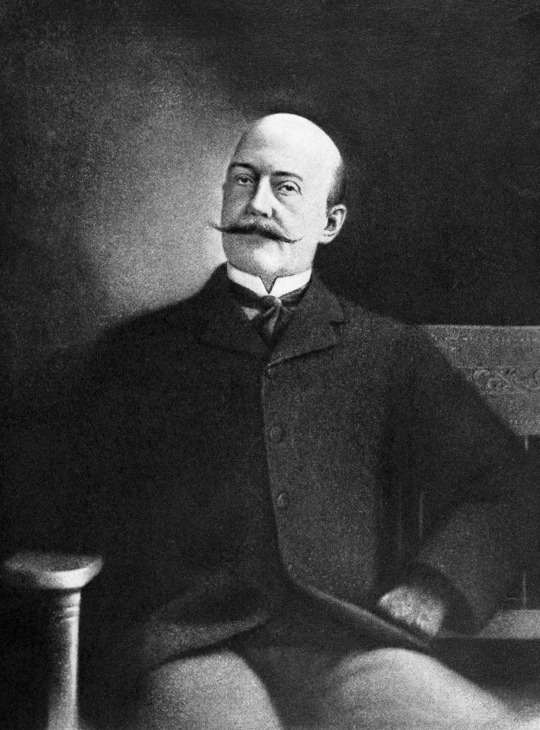
1836 – Winslow Homer (d.1910) was an American landscape painter and printmaker, best known for his marine subjects. One of the most prolific and important American painters and printmakers of the second half of the nineteenth century, Winslow Homer created a distinctly American, modern classical style.
Homer dealt with many of the same themes that writers such as Henry Thoreau, Herman Melville, and Walt Whitman did, including the heroism displayed by ordinary individuals, when confronted by seemingly insuperable difficulties; the camaraderie and friendships enjoyed by soldiers and working men; and the isolation of the individual in the face of the "Other."
Born in Boston on February 24, 1836, Homer was initially trained as an artist by his mother, Henrietta Benson Winslow, who successfully exhibited watercolors of flowers and other still life subjects throughout her adult life.
Between 1855 and 1857, he was apprenticed to John H. Bufford, a nationally prominent commercial artist, based in Boston; with this training, he began to do free-lance work for Harper's Weekly and other magazines.
In 1861, Homer was commissioned by Harper's Weekly as a special artist/correspondent to record the events of the Civil War. Homer failed to produce the heroic battle scenes that his editors had wanted. Yet his images of the daily lives of ordinary soldiers greatly appealed to the magazine's readers and helped to establish his reputation.
Among other subjects, he represented guard duty (A Sharp-Shooter on Picket Duty, wood engraving, 1867); punishments for minor infractions (A Punishment for Intoxication, painting, 1863); medical care for the wounded (The Surgeon at Work at the Rear During an Engagement, wood engraving, 1862); and recreation (Soldier Dancing, drawing, 1862).

The Empty Sleeve at Newport
As the war ended, Homer revealed the personal "costs" of the conflict in such images as The Empty Sleeve at Newport (wood engraving, 1865), which represents a one-armed man, riding in a carriage with a sad, aloof well-dressed woman.
Very little is known about Homer's "private" life. He consistently refused to answer personal questions from critics and potential biographers, and he left no revealing diaries or other personal papers. His reclusiveness is indicated by the fact that he produced no self-portraits; in contrast, most American and European painters of the nineteenth century eagerly exploited the rapidly growing market for images of artists.
Most historians have adamantly maintained that Homer remained a bachelor because he was extraordinarily "shy" around women. However, it would seem more plausible to suggest that Homer simply may not have been interested in women sexually.
Constructing Homer as a solitary eccentric, who virtually withdrew from human society, most scholars have overlooked evidence of significant, intimate associations with other men.
One of his closest friends was Albert Kelsey, a fellow artist whom he initially met in 1858 in Massachusetts. In 1867, Kelsey traveled with Homer to Paris, where they lived together for the next two years.
A studio photograph, made while they were in Paris, mimics the conventions of marriage portraits, as do so many photographic portraits of male friends of this period. Kelsey inscribed the back of the photograph with the names "Damon and Pythias," famous ancient Greek heroes and lovers.In the 1890s, Homer remembered their friendship in the humorous and erotically suggestive drawing "Albert Kelsey riding a giant turtle in the Bahamas."
Homer's closest companion in the final years of his life was an African-American man, Lewis Wright, who worked as his servant and lived at his Prout's Neck, Maine estate from 1895 to 1910. There are indications that some of Homer's acquaintances were disconcerted by the apparent closeness of his friendship with Wright. While most "negative" reactions involved race, other "unmentionable" factors may also have been involved.
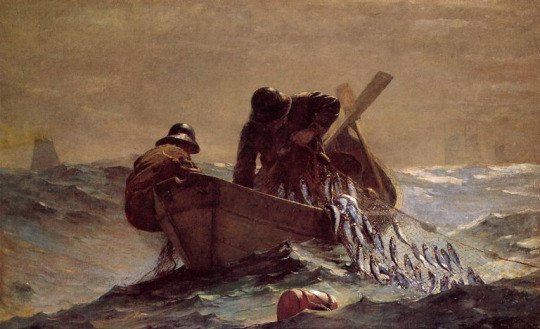
The Herring Net
Throughout his career, Homer created images that celebrated diverse aspects of male friendships. Thus, he depicted soldiers, unified in melancholy longing for peacetime home life (Home, Sweet Home, 1863); wilderness guides enjoying the beauties of nature (Two Guides, 1871); and fishermen laboring together (The Herring Net, 1885) and coping with dangerous storms (The Signal of Distress, 1890).
Homer died on September 29, 1910 in Prout's Neck, Maine.


1852 – The Irish novelist, short-story writer, poet, art critic, memoirist and dramatist, George Moore was born on this date (d.1933). Moore came from a Roman Catholic landed family. He originally wanted to be a painter, and studied art in Paris during the 1870s. There, he befriended many of the leading French artists and writers of the day.
As a naturalistic writer, he was amongst the first English-language authors to absorb the lessons of the French realists, and was particularly influenced by the works of Émile Zola. His writings influenced James Joyce, according to the literary critic and biographer Richard Ellmann, and, although Moore's work is sometimes seen as outside the mainstream of both Irish and British literature, he is as often regarded as the first great modern Irish novelist.
According to Brian Lacey's new book, Queer Creatures: A History of Homosexuality in Ireland, Moore outed his good friend, the artist Edward Martyn, in his three-volume masterpiece Hail and Farewell (published between 1911 and 1914). Moore, who was attracted to the handsome young Yeats, later fell in love with the celebrated French painter Edouard Manet, who painted three portraits of him. Moore was influenced by the homosexual Oxford critic Walter Pater, and Moore's 1879 work, "Flowers of Passion," already contained references to Lesbianism. Moore's 1887 novel, A Mere Accident, also has a homosexual theme and its central character is again based on Martyn.

1868 – The first parade to have floats is staged at Mardi Gras in New Orleans, Louisiana.

1938 – A California appellate court upholds an oral copulation conviction of a man in a hotel after naval investigators listened in and heard his bed squeaking.

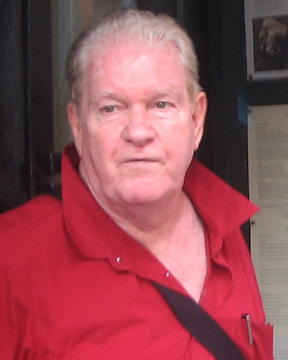
1939 – Doric Wilson (d.2011), the American playwright, was born on this date. Some people write for the "alternative" theatre because they aren't good enough for Broadway. Doric Wilson wrote for it because he was too good for the Great White Way.
Wilson was one of the first playwrights at NYC's legendary Caffe Cino, his comedy "And He Made A Her" opening there in 1961. Other Cino productions followed, including "Now She Dances!" (one-act version), "Babel Babel Little Tower " and "Pretty People" .
Street Theater, Wilson's best-known play, is a fictionalization of the Stonewall riots, an event in which Wilson took part. Using satire and exaggeration, Wilson recreates the milieu of street culture in Greenwich Village in the late 1960s, presenting characters variously described as "heavy leather, keys left," "a flower child," and "a street queen." The characters are archetypes representing both the disparate groups involved in the riot and also real people Wilson knew. A complex parody of Wilder's Our Town and Crowley's The Boys in the Band, the play is both deeply literary and deeply rooted in a particular time and place.
A veteran of the anti-war and civil rights demonstrations of the early 1960s-mid 1970s, Wilson was a participant in the Stonewall Riots. An active participant in the early gay liberation movement, Wilson was a member of the Gay Activists Alliance (GAA). He helped support himself as a bartender and manager of several bars and clubs that sprouted up in the wake of Stonewall, including such institutions as Spike, Ty's, and Brothers & Sisters Cabaret. Wilson's activism and his thorough immersion in New York's gay community are reflected significantly in his work.
In 1974, Wilson (with Billy Blackwell, Peter del Valle and John McSpadden) formed TOSOS (The Other Side of Silence), the first professional theatre company to deal openly and honestly with the gay experience. The company featured new plays and revivals by such writers as Brendan Behan, Noël Coward, Christopher Hampton, Charles Jurrist, Joe Orton, Terrence McNally, Robert Patrick, Sandra Scoppettone, Martin Sherman and Lanford Wilson. In June, 2001, Wilson, and directors Mark Finley and Barry Childs resurrected the company as TOSOS II. The original TOSOS and its production of Doric Wilson's play The West Street Gang are featured in "Perform", the new permanent exhibit on theatre at The Museum of New York City.
A pioneer in the Off-Off-Broadway movement, he was completely committed to alternative theater and over the past 25 years has written, directed and produced more than a hundred productions. Such plays as Forever After, A Perfect Relationship , and The West Side Gang made him not only "one of a handful of leading contemporary playwrights who deal frankly with the Gay experience," but a satirist of the first water whose targets - hypocrisy, cant, and simply human foibles - are universal.

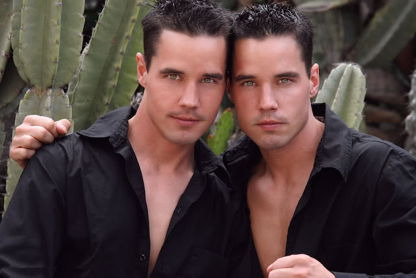
1975 – Gary Lane and Larry Lane, born in Goldsboro, N.C., are identical twin actors, models, film producers and screenwriters. They are both gay. The twins have appeared in feature films and national TV ads and are three-time grand prize champions of reality TV competitions. They are best known for a film they co-produced and appeared in, Hollywood to Dollywood, a feature-length documentary released theatrically in 2012. The film, about their quest to personally deliver a screenplay they've written to singer-actress Dolly Parton, played at 60 film festivals and won 24 festival awards.
Since the early 2000s, the Lane twins have appeared in feature films, TV programs, reality TV shows and TV commercials. As teenagers, they appeared on several episodes of Dawson's Creek and played twin colonial flag bearers in the Mel Gibson film The Patriot (2000). Other film appearances include Zoolander (2001), New Best Friend (2002), Spider-Man (2002), The Girl Next Door (2004), Eating Out 3: All You Can Eat (2009), and Jack and Jill (2011)
youtube
The Lane Twins talk of their life
The twins have competed on and won $50,000 on NBC's Fear Factor; beat out 24 other contestants for the grand prize of $50,000 on ABC's Winter Wipeout; and won $125,000 on the reality TV competition Set For Life. Gary Lane said their goal for appearing on these shows was to win money to pay for music rights and production costs associated with their documentary Hollywood to Dollywood. "For every wipeout, I would say, 'that was for Jolene, and for every ouch, 'that was for Coat of Many Colors!,'" Gary Lane said, referring to the need to raise money for licensing rights to hit Parton songs.
The Lane twins wrote a screenplay, Full Circle, which includes a role tailored for Dolly Parton. They submitted the script to Parton's management, but Parton's managers returned it as "unsolicited material." The twins decided to drive from Los Angeles, where they live, to Parton's theme park in Tennessee, Dollywood. The goal was to try and hand their script to Parton during one of her appearances at Dollywood's 25th anniversary celebration. In addition, the documentary explores the Lane twins' concerns about their Southern hometown's potential reaction to the film (and to the brothers' homosexuality) and their desire for acceptance from their Southern Baptist mother. Also on the journey is Gary's partner, Michael Bowen, who has crafted a birdhouse for Ms. Parton. The journey to deliver their screenplay is the focus of their documentary feature, Hollywood to Dollywood, which played at 60 film festivals throughout 2011 and 2012, winning 24 awards.
Parton makes an appearance in the film. After viewing the documentary, she gave the twins rights to use her music and likeness in its promotions. The Lane twins donate 10 percent of each Hollywood to Dollywood DVD sold to Parton's Imagination Library, an organization that provides free books to young children and is part of the Dollywood Foundation.

Today's Gay Wisdom:

George Moore
Faith goes out of the window when beauty comes in at the door. - George Moore
The mind petrifies if a circle be drawn around it, and it can hardly be denied that dogma draws a circle round the mind. - George Moore
A man travels the world over in search of what he needs and returns home to find it. - George Moore
A great artist is always before his time or behind it. - George Moore
I am filled with pride when I think of the noble and exalted world that must have existed before Christian doctrine caused men to look upon women with suspicion and bade them to think of angels instead. - George Moore
The world is dying of machinery; that is the great disease, that is the plague that will sweep away and destroy civilization; man will have to rise against it sooner or later. - George Moore
The difficulty in life is the choice.
- George Moore



26 notes
·
View notes
Text
🇺🇸Army of the United States🇺🇸: A military lookbook
PART I

The evolution of U.S. Army uniforms from the Revolutionary War to the present day reflects changes in technology, tactics, and the roles of the military:
Revolutionary War (1775-1783): The Continental Army, at this time, did not have a standardized uniform. Soldiers often wore civilian clothing, and the most common item was the blue or brown coat, with a distinctive cocked hat. Militiamen and volunteers wore a variety of outfits.
War of 1812 (1812-1815): The War of 1812 saw the introduction of blue wool coats, often referred to as "roundabouts" or "shell jackets," for the regular army. They were typically trimmed with gold stripes or white. Soldiers also wore the distinctive 'Shako' hat.
Civil War (1861-1865): The Civil War era marked the transition from brightly colored uniforms to the more familiar blue and gray, with distinctive kepis (caps) and frock coats for the Union and Confederate armies, respectively.
A big thanks to all CC creators: @viktorviolettaenterprises @revolution-sims @linzlu @albumenplumbob @bruxel-reign
#sims 4#ts4 cc#ts4 lookbook#ts4 military#militarycc#military#viktorviolettaenterprise#revolutionsims#american#revolutionary war#civil war#ts4 history challenge#ts4 historical#historical cc#ts4 decades challenge#historical fashion
40 notes
·
View notes
Photo

The American Civil War began on April 12, 1861 with the Confederate attack on Fort Sumter. From 1863, after the Battle of Gettysburg, the Unionists gradually gained ground to prevail definitively in 1865 with the capitulation of General Lee at Appomatox
by @LegendesCarto
97 notes
·
View notes
Text
youtube
Horizon : An American Saga | In Theaters June 2024 and August 2024

Teaser poster
Synopsis
In the great tradition of Warner Bros. Pictures’ iconic Westerns, “Horizon: An American Saga” explores the lure of the Old West and how it was won—and lost—through the blood, sweat and tears of many. Spanning the four years of the Civil War, from 1861 to 1865, Costner’s ambitious cinematic adventure will take audiences on an emotional journey across a country at war with itself, experienced through the lens of families, friends and foes all attempting to discover what it truly means to be the United States of America.
#Horizon An American Saga#Kevin Costner#Sienna Miller#Sam Worthington#Jena Malone#Abbey Lee#Michael Rooker#Danny Huston#Luke Wilson#Isabelle Fuhrman#Jeff Fahey#Will Patton#Tatanka Means#Owen Crow Shoe#Ella Hunt#Jamie Campbell Bower#New Line Cinema#Territory Pictures#Warner Bros.#Warner Bros. Pictures#film#live action#live action film
25 notes
·
View notes
Text
A Review of Steven E. Woodworth's Jefferson Davis and His Generals: The Failure of Confederate Command in the West.
Newest book review is available!
Jefferson Davis and his Generals: The Failure of Confederate Command in the West. By Steven E. Woodworth. Lawrence: The University Press of Kansas, 1990. ISBN: 0-7006-0461-8. Illustrations. Bibliographic Essay. Index. Pp. 380. $36.95 (cloth)
At the outset of the American Civil War, Confederate President Jefferson Davis outmatched President Abraham Lincoln in most respects, including political…

View On WordPress
0 notes
Photo

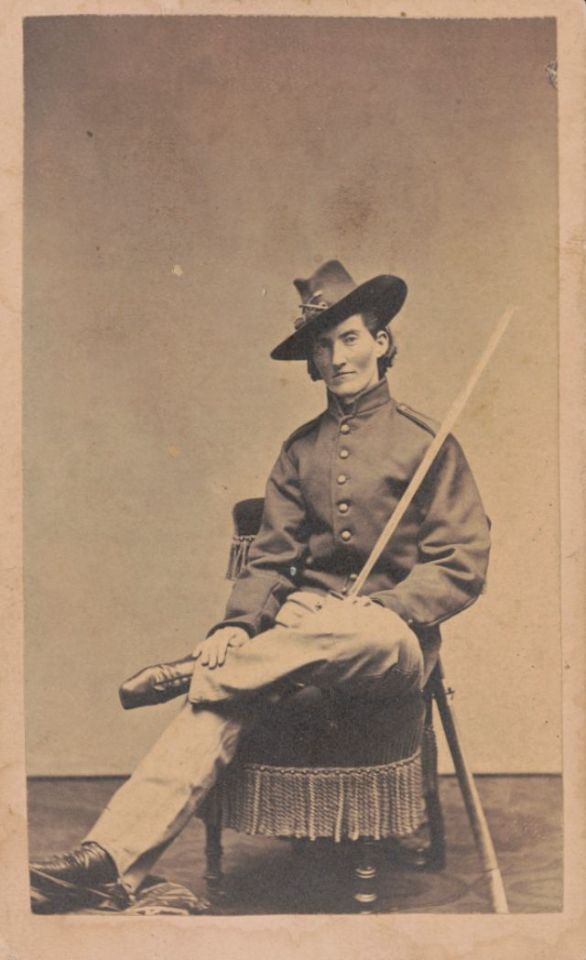

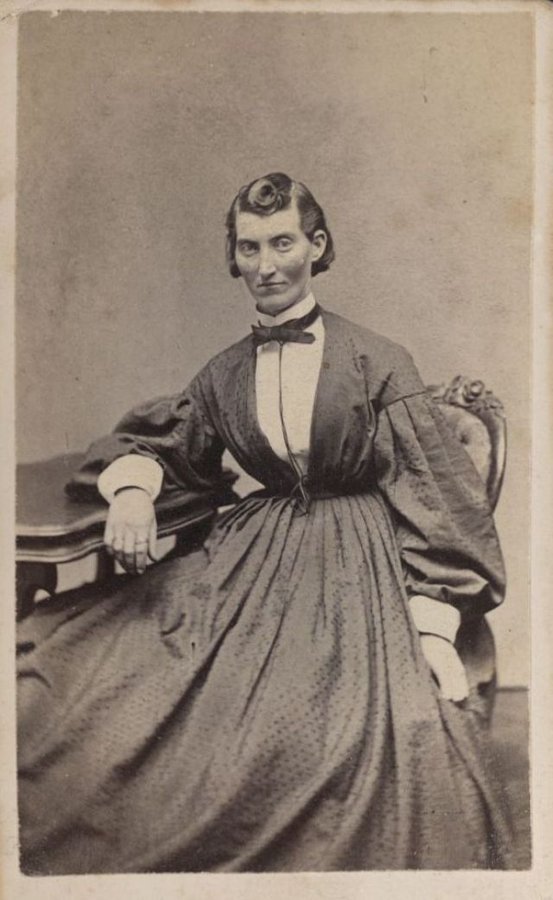
Frances Clayton was a woman who enlisted in the Union Army under the pseudonym “Jack Williams” in order to serve alongside her husband during the Civil War. Her husband was killed during the Battle of Stones River December 31, 1862, Clayton continued to fight after watching her husband die at her feet. Photographed betweeen 1861 and 1865.
124 notes
·
View notes